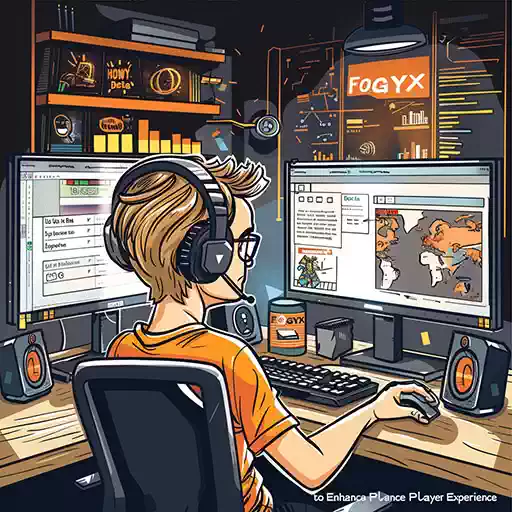How FOGYX Uses Data to Enhance Player Experience
From understanding player preferences to analyzing in-game behavior, data allows us to make informed decisions that help us shape and optimize our online games and free games. In this article, we’ll explore the ways in which FOGYX uses data to enhance player experience, improve gameplay, and create dynamic, engaging environments that keep players coming back for more.

1. Data-Driven Game Development: A New Era
The traditional approach to game development largely relied on intuition and creativity. While those are still essential components, today’s game development landscape has evolved to include data-driven decisions. At FOGYX, we leverage data to understand how players interact with our games, what they enjoy, and what challenges or frustrates them. This information allows us to make informed improvements that lead to more satisfying gaming experiences.1.1 The Importance of Player Feedback
One of the most valuable sources of data comes directly from the players. Whether it’s through feedback forms, social media, or in-game surveys, we collect player feedback to understand what works and what doesn’t. While subjective opinions provide valuable insights, it’s through analyzing patterns in feedback that we can see the bigger picture and make the right changes.For example, if a significant portion of our player base suggests that a certain level is too difficult or that a feature is too complicated, we take that feedback into account. By combining qualitative feedback with quantitative data (such as how many players are struggling to complete a specific level), we can make adjustments that improve the gameplay experience for the majority of players.
1.2 Tracking In-Game Behavior
Beyond direct feedback, FOGYX uses behavioral data to understand how players engage with our games. This includes tracking how long players spend on certain levels, which game modes they prefer, and how frequently they return to the game. By analyzing this data, we can identify areas where players are most engaged and pinpoint where they may lose interest or become frustrated.For example, if we notice that players tend to quit after encountering a specific challenge, we might investigate whether that challenge is too difficult or not rewarding enough. On the flip side, if players spend more time in a particular mode or level, we can enhance that feature to increase engagement across the board.

2. Personalization Through Data
One of the most exciting ways FOGYX uses data is by creating personalized experiences for our players. Personalization is no longer limited to just the most popular online platforms—today, it’s a key part of gaming as well. By understanding individual player preferences and behaviors, we can tailor the game to suit their specific play style.2.1 Customizing Player Journeys
Not every player engages with a game in the same way. Some may be looking for a casual experience, while others crave competitive challenges. By analyzing player behavior, we can segment players based on their preferred play styles and offer them personalized content that matches their interests.For instance, a player who consistently chooses harder difficulty levels or competitive multiplayer modes might receive updates or suggestions for more challenging content. On the other hand, a player who enjoys exploring and completing side missions might be encouraged to try new quests or receive hints about hidden areas within the game. This level of personalization ensures that players remain engaged and feel like the game is adapting to their preferences.
2.2 Dynamic Difficulty Adjustment (DDA)
One of the most effective ways we use data to enhance the player experience is through dynamic difficulty adjustment (DDA). By analyzing how well a player is performing, we can adjust the difficulty of the game in real-time to match their skill level. If a player is breezing through levels, the game might introduce more complex challenges to keep them engaged. Conversely, if a player is struggling, the game might subtly reduce the difficulty to prevent frustration and encourage progression.At FOGYX, our goal is to strike the right balance between fun and challenge. By using DDA, we can create a seamless experience that keeps players in the optimal “flow state,” where they are neither too bored nor too frustrated.

3. Data-Driven Game Updates and Patches
One of the challenges of maintaining a successful online game is ensuring that it remains fresh and balanced. That’s where data comes in. By continuously monitoring how players interact with our games, we can release updates and patches that improve the experience based on real-world data rather than just developer assumptions.3.1 Balancing In-Game Economy and Rewards
In free games, especially those with in-game economies or microtransactions, it’s critical to ensure that the economy is balanced in a way that keeps the game enjoyable for all players—whether they are spending money or not. Data helps us understand how players are interacting with the in-game economy, such as how they earn and spend virtual currency, and whether they find rewards satisfying.For example, if we notice that players are earning rewards too quickly, making the game feel less challenging, we can adjust the in-game economy to slow down progression slightly. Conversely, if rewards are too difficult to earn, we can make adjustments to ensure that players feel like they are making meaningful progress.
3.2 Identifying and Fixing Bugs
Data also plays a crucial role in identifying technical issues such as bugs, glitches, or performance problems. By tracking where players experience crashes, freezes, or other issues, we can quickly address these problems in future patches. For example, if we notice a sudden spike in crashes during a specific level or when using a particular feature, we investigate and push out a fix before it affects a larger portion of the player base.The ability to monitor technical issues in real-time allows us to keep our games running smoothly and ensures that players have a consistent and enjoyable experience.

4. Improving Player Retention Through Data Insights
Retaining players is one of the most important aspects of game development, especially in online games and free games where player engagement is crucial for long-term success. Data helps us understand what keeps players coming back and where we might be losing them along the way.4.1 Identifying Drop-Off Points
By analyzing player progression data, we can identify drop-off points—specific areas or stages of the game where players tend to quit or disengage. This insight allows us to investigate whether these drop-offs are due to difficulty spikes, lack of content, or other frustrations. Once identified, we can implement changes to smooth out these problem areas and make the experience more seamless.For example, if players consistently stop playing after completing a certain number of levels, we might introduce new content at that stage to reignite their interest. Alternatively, we might adjust the pacing or reward system to encourage continued engagement.
4.2 Engagement Through Events and Seasonal Content
One of the most effective ways to retain players is through the introduction of seasonal events and limited-time content. By using data to understand player behavior, we can launch events at the right times, with the types of content that are most likely to drive engagement.For instance, data might show that players tend to be most active during specific times of the year, such as holidays or weekends. We can use this information to schedule exciting in-game events during those periods, offering exclusive rewards or challenges that align with player preferences.
At FOGYX, we regularly analyze data to ensure that our events are engaging, timely, and designed to bring players back to the game in fun and creative ways.
5. The Future of Data-Driven Game Development
As the gaming industry continues to evolve, the role of data in game development will only grow. With advancements in machine learning and artificial intelligence, we’re likely to see even more sophisticated ways of using data to personalize experiences, enhance gameplay, and create games that adapt to each player’s unique preferences.At FOGYX, we’re committed to staying at the forefront of this trend, using data to ensure that every player—whether they’re enjoying our free games or competing in our online games—has an experience that is tailored to their needs.
5.1 Ethical Use of Data
While data is a powerful tool for enhancing the player experience, it’s also important to use it ethically. At FOGYX, we prioritize player privacy and ensure that all data is collected and used responsibly. We believe that data should be used to improve the gaming experience, not to manipulate or exploit players.By being transparent about how we use data and giving players control over their privacy settings, we aim to build trust and foster a positive relationship with our community.
Conclusion: Data as a Tool for Better Gaming
In today’s gaming landscape, data has become an essential tool for improving player experience. Whether we’re tracking in-game behavior, personalizing content, or fine-tuning difficulty, data allows us to make informed decisions that result in better, more engaging games.At FOGYX, we believe that the key to creating successful online games and free games lies in understanding our players. By using data to listen to their needs, monitor their behavior, and adapt to their preferences, we’re able to deliver games that not only entertain but also evolve alongside our players.
As technology advances, data-driven game development will continue to shape the future of the industry, and we’re excited to be part of that journey—constantly refining and enhancing the gaming experience for our community.
28 October 2024
More articles

In an increasingly connected world, video games are no longer just about individual achievements or solo quests. Multiplayer online games have redefined the gaming landscape, turning it into a truly global experience. These games do much more than just provide entertainment; they create platforms for players from different countries, cultures, and backgrounds to interact, collaborate, and compete in real time.

When you think about what makes a great game, what comes to mind first? Is it the gameplay, the storyline, or perhaps the mechanics? While all of these are important, there's another crucial element that often gets overlooked but plays a significant role in keeping players engaged—art and sound. These two elements aren't just the icing on the cake; they are the foundation upon which immersive game worlds are built.

In the ever-evolving landscape of video games, multiplayer experiences have become a cornerstone of the industry. With the rise of online gaming and the global connectivity it offers, players are no longer limited to solo adventures. Instead, they can now dive into thrilling, interactive worlds with friends or compete against others across the globe. But what makes a multiplayer game truly engaging? At FOGYX, we believe that the magic of multiplayer games lies in creating a balance of competition, collaboration, and social interaction, all while keeping the experience fun, accessible, and endlessly replayable.
all articles
